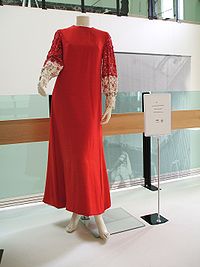Lenny Kuhr
show This article may be expanded with text translated from the corresponding article in Dutch. (January 2014) Click [show] for important translation instructions. |
This biography of a living person needs additional citations for verification. (June 2014) |
Lenny Kuhr | |
|---|---|
 Kuhr at Het Grote Songfestivalfeest in 2019 | |
| Background information | |
| Birth name | Helena Hubertina Johanna Kuhr |
| Born | 22 February 1950 Eindhoven, Netherlands |
| Occupation(s) | Singer-songwriter |
Helena Hubertina Johanna "Lenny" Kuhr (born 22 February 1950) is a Dutch singer-songwriter.
Career[]


In 1967, she started a singing career in the Netherlands, performing songs in the French chanson tradition. In 1969, she represented the Netherlands in the Eurovision Song Contest with her composition "De troubadour" (lyrics by David Hartsema; orchestra conducted by Franz de Kok). She was one of the four winners that year.
In the early seventies, Kuhr was more successful in France than in her home country. She topped the French charts in 1972 with the song "Jesus Christo" and performed in the shows of Georges Brassens.
In 1980, she had her biggest hit in the Netherlands: "Visite", a song she performed together with the French group Les Poppys. She has been releasing records ever since, though without major chart success.
In 1982, Kuhr hosted the Nationaal Songfestival, the Dutch national selection for the Eurovision Song Contest.
Kuhr was one of the artists who recorded the song "Shalom from Holland" (written by Simon Hammelburg and Ron Klipstein) as a token of solidarity to the Israeli people, threatened by missiles from Iraq, during the Gulf War in 1991.
Personal life[]
Kuhr's first marriage was in 1974 to an Israeli doctor, whom she met after she had her nose damaged in an attack in May 1973, in Haarlem. Her new husband repaired her nose and Kuhr converted to Judaism. She had two daughters with her first husband, one in 1975 and the second in 1980. She also lived in Israel for a while.[1][2]
After her divorce, Kuhr was romantically involved with songwriter Herman Pieter de Boer, from 1981 to 1993.
She was married for a second time in 2003.
Discography[]
- 1969: De troubadour
- 1971: De zomer achterna
- 1972: Tout ce que j'aime / Les enfants
- 1972: De wereld waar ik van droom
- 1974: God laat ons vrij
- 1976: 'n Dag als vandaag
- 1980: Dromentrein
- 1981: Avonturen
- 1982: Oog in oog
- 1983: De beste van Lenny Kuhr
- 1986: Quo vadis
- 1988: Lenny Kuhr
- 1990: Het beste van Lenny Kuhr
- 1990: De blauwe nacht
- 1992: Heilig vuur
- 1994: Altijd heimwee
- 1997: Gebroken stenen
- 1997: Stemmen in de nacht
- 1999: Oeverloze liefde
- 2000: Visite
- 2001: Hollands glorie
- 2001: Fadista
- 2004: Op de grens van jou en mij
- 2005: Panta Rhei
- 2007: 40 Jaar verliefd
- 2010: Hollands glorie
- 2010: Mijn liedjes mijn leven
- 2011: Liefdeslied
- 2013: Wie ben je
- 2017: Gekust door de eeuwigheid
- 2019: Het lied gaat door
References[]
- ^ [1] Archived 10 February 2010 at the Wayback Machine
- ^ "Biografie". Lenny Kuhr. Retrieved 6 June 2014.
External links[]
| Wikimedia Commons has media related to Lenny Kuhr. |
- Official website (in Dutch)
- 1950 births
- Living people
- Converts to Judaism
- Eurovision Song Contest entrants for the Netherlands
- Dutch expatriates in Israel
- Dutch female singers
- Dutch Jews
- Dutch singer-songwriters
- Eurovision Song Contest entrants of 1969
- Eurovision Song Contest winners
- Jewish musicians
- Musicians from Eindhoven
- Philips Records artists
- Nationaal Songfestival contestants
- Nationaal Songfestival presenters